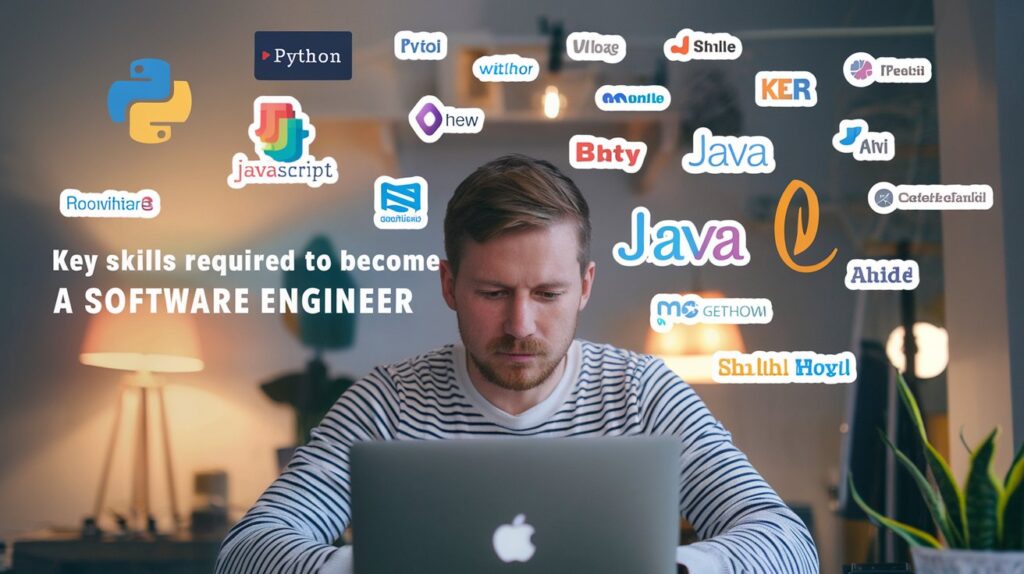How to Become a Software Engineer in 2025
In 2025, the demand for software engineers continues to soar as technology evolves and shapes every aspect of our lives. From developing cutting-edge applications to solving complex challenges in industries like healthcare, finance, and entertainment, software engineering has cemented its place as a future-proof and highly rewarding career.
Whether you’re dreaming of joining a tech giant, building innovative startups, or even freelancing from anywhere in the world, the opportunities for software engineers are boundless. However, the path to this exciting profession requires focus, dedication, and the right guidance.
In this blog, I’ll share actionable steps and insights to help you understand how to become a software engineer in 2025. By the end, you’ll know exactly where to start, which skills to prioritize, and how to navigate the ever-evolving tech landscape. Let’s dive in and kickstart your journey into this promising career field!

Why Choose Software Engineering in 2025?
In 2025, software engineering remains one of the most sought-after and high-paying careers. As a MERN stack developer, I believe this field continues to thrive because technology is advancing at an incredible pace, and the demand for skilled professionals who can solve real-world problems is greater than ever.
One of the biggest reasons to pursue software engineering is the financial rewards. Lucrative salaries, especially for skilled developers who know how to leverage AI tools effectively, make it an attractive career choice. Remote work opportunities have also expanded, giving software engineers the flexibility to work from anywhere while collaborating on exciting projects with global teams.
Moreover, job security in tech is stronger than in most industries. Companies need software engineers not just to build systems but also to maintain and improve them, especially as AI becomes a more integral part of development. However, the engineers who stand out in 2025 will be those who understand how to use AI tools like GitHub Copilot or ChatGPT to save time and enhance productivity.
In my opinion, software engineers are not just writing code—they’re shaping the future. If you’re ready to embrace continuous learning and innovation, this career will offer you endless growth and success.
Key Skills Required to Become a Software Engineer
When I started my journey as a MERN stack developer, I quickly realized that having the right mix of technical and soft skills is crucial for success in software engineering. In 2025, this remains true, especially as the tech industry continues to evolve with AI and machine learning advancements.

First, let’s talk about technical skills. Mastering programming languages is essential. In my opinion, JavaScript will still dominate backend technologies because of its versatility and widespread use in web development. At the same time, Python is becoming increasingly important, especially as industries like AI and machine learning grow rapidly. Understanding data structures and algorithms is another key skill, as it forms the backbone of problem-solving and efficient coding. Tools like Git for version control and platforms like GitHub are also must-haves for managing projects and collaborating with teams.
Soft skills are equally important. Good communication helps you explain your ideas and work effectively with teammates. Teamwork is essential, especially when building large-scale applications, and adaptability will set you apart in this fast-changing industry.
In 2025, to become a successful software engineer, focus on combining these technical skills with the ability to leverage AI tools like GitHub Copilot to boost productivity. With a strong foundation and a growth mindset, you’ll be well on your way to thriving in this rewarding field.
Learning Pathways to Start Your Software Engineering Journey
When I started my software engineering journey, I explored different learning pathways before discovering what worked best for me. In 2025, aspiring software engineers have three main options: self-learning, coding bootcamps, and computer science degrees. Each has its own benefits, so it’s important to choose the one that aligns with your goals and learning style.
Self-learning is a great option if you prefer flexibility and want to learn at your own pace. Platforms like freeCodeCamp, Codecademy, and Udemy provide excellent resources for beginners and beyond. I personally found that focusing on project-based learning was the most effective way to understand and apply new concepts. Building real-world projects not only boosts your confidence but also helps you create a portfolio to showcase your skills.
Coding bootcamps are ideal if you’re looking for a fast and intensive learning experience. In just a few months, you can gain hands-on experience with industry-relevant skills. While bootcamps can be pricey, their focus on practical skills and job placement support often make them worth the investment.
Computer science degrees provide a deeper understanding of theoretical concepts like algorithms and data structures. They also open doors to diverse tech roles, but they take several years to complete and may not focus heavily on practical coding skills.
In my opinion, combining self-learning with project-based learning offers the best of both worlds. It allows you to move at your own pace while gaining practical experience. No matter which pathway you choose, staying consistent and dedicated will help you achieve your goal of becoming a software engineer in 2025.
Building Your Portfolio and Gaining Experience
In my opinion, building your portfolio should start from day one of your programming journey. Your portfolio is your first impression for potential employers and clients, and it showcases your skills, growth, and passion for software engineering. Using platforms like GitHub to host your projects is an excellent way to document your journey and demonstrate your expertise.
Creating real-world projects is essential to building a strong portfolio. Focus on developing web applications, mobile apps, or tools that solve specific problems. For example, while learning MERN stack development, I worked on projects like a weather app, an e-commerce platform, and even a Facebook clone. These projects not only helped me understand practical implementation but also became valuable assets in my portfolio.
Don’t overlook the power of open-source contributions. Collaborating on open-source projects exposes you to industry-level practices, improves your coding skills, and shows your ability to work in a team. Platforms like GitHub and GitLab are excellent for finding open-source opportunities.
Internships are another great way to gain experience while building your portfolio. They provide hands-on exposure to professional work environments, and even unpaid internships can offer invaluable learning experiences. I started my career with an unpaid internship, and it became a stepping stone to my first paid role.
Finally, consider freelancing opportunities to build a diverse range of projects while earning an income. Websites like Upwork and Fiverr can help you connect with clients looking for software developers.
By consistently adding impactful projects, documenting your progress on GitHub, and gaining real-world experience, you’ll create a portfolio that not only reflects your skills but also helps you stand out as you pursue your goal of becoming a software engineer in 2025.
Navigating the Job Market in 2025
Finding a software engineering job in 2025 might feel overwhelming, but with the right strategies, it’s absolutely achievable. The tech industry is full of opportunities, and by focusing on the right steps, you can land your dream role as a software engineer in 2025.
Start by building a strong network. Platforms like LinkedIn are powerful tools for connecting with industry professionals, recruiters, and mentors. Join tech-related groups, participate in discussions, and share your projects to increase visibility. Networking is not just about finding jobs; it’s about creating relationships that can open doors to new opportunities.
Next, use specialized job portals like your own platform (TechRer!) or other tech-focused websites to find openings tailored to software engineering. Many companies post roles specifically for entry-level or experienced developers on these platforms, making it easier to find the right fit.
Preparing for technical interviews is a critical part of navigating the job market. Focus on mastering data structures, algorithms, and problem-solving techniques, as these are common in coding tests and interviews. Practice mock interviews on platforms like LeetCode or HackerRank to build confidence. I remember spending hours on these platforms, and it made a significant difference during my own interviews.
Tailor your resume and portfolio to showcase relevant skills and projects. Highlight experiences that demonstrate your problem-solving abilities, teamwork, and knowledge of programming languages. Recruiters look for evidence of your ability to deliver results, so make sure your GitHub portfolio is updated and reflects your best work.
By leveraging networking, job portals, and thorough interview preparation, you’ll position yourself to succeed in the competitive software engineering job market in 2025. Keep learning, stay proactive, and don’t hesitate to reach out for guidance from peers and mentors.
Conclusion
Becoming a software engineer in 2025 is an achievable and rewarding journey if you follow the right steps and remain consistent. By focusing on building key technical and soft skills, choosing the best learning pathway, creating a strong portfolio, and navigating the job market effectively, you can set yourself up for success in this ever-growing field.
The path may have challenges, but remember, every coding journey is a story of persistence and growth. Whether you’re learning through bootcamps, self-study, or formal education, staying committed to your goals will lead to incredible opportunities for career advancement in tech.
Take the first step today, and don’t let fear hold you back. The demand for skilled software engineers continues to grow, and the possibilities for innovation are limitless. Your journey to becoming a software engineer in 2025 could be the start of a transformative and fulfilling career. Keep learning, stay motivated, and create a success story that inspires others.

